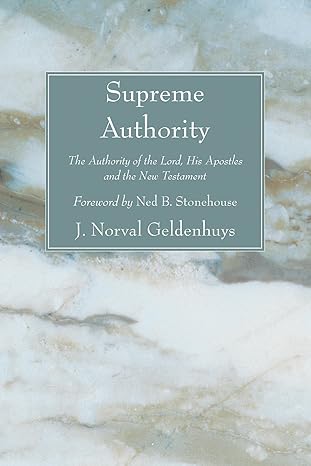A Brief Book Notice from Books At a Glance
J. Norval Geldenhuys, perhaps best known for his highly acclaimed Commentary on the Gospel of Luke (1951), was a minister in the Dutch Reformed Church of South Africa. This book, Supreme Authority, very highly acclaimed also, treats the vital and foundational subject of the authority of Jesus and of his apostles.
However obvious the relation between these two may seem to the reader, the author points out that in contemporary theology little appreciation is shown of the fact of the Lord’s supreme authority in the New Testament and in the Early Church, and that much confusion exists in many modern theories concerning the history of primitive Christianity and of the formation of the New Testament. Second only to this, Mr. Geldenhuys shows, is the importance of understanding the authority of the apostles.
To bring out most sharply the authority of Jesus and his apostles, the author allows the two primary sources of his subject, the New Testament and other Early Church documents, to speak for themselves as far as possible, thus presenting a positive exposition of his subject. The theories of Harnack, Enslin, Bousset, Manson, and many others who try to escape full acceptance of the New Testament or Early Christian presentation of the authority of the Lord and of His apostles, come in for discussion and comment.
Table of Contents
Foreword: Ned B. Stonehouse
Introduction
Definition of the Term “Authority”
A) The Authority of the Lord in the New Testament and the Early Church
B) The Authority of the Apostles in the New Testament and the Early Church
C) The New Testament Formed and Clothed with the Authority of the Lord and of His Apostles
D) Conclusion
Selected Quotes:
- The authority of Jesus and of His apostles was of the most basic importance for the beginning and development of Christianity. (13)
- In view of this rich background for its use, it is clear that ἐξουσία is a very comprehensive term and excellently suited to express the idea of an all-inclusive authority, in the sense of the freedom and the power to command and to enforce obedience, and to have possession of, and rule and dominion over. (16)
- Throughout the Gospels and Acts our Lord is revealed to us as the Son of God clothed with supreme authority. (18)
- Jesus, however, did not merely claim to possess authority, but also exercised His ἐξουσία throughout His ministry in word and deed (21)
- It could not be more clearly proclaimed that Christ is the final word of God to man, and so possesses ultimate authority in all He said, did and is. (37)
- By a systematic examination of our sources we find that the same absolute authority of the Lord that is so clearly revealed to us in the New Testament is ascribed to Him in the writings of the Apostolic Fathers and other Early Church writers. (38)
- Not only did the apostles preach and teach with manifest authority but they also acted with authority in guiding the life of the Church in those early days. And their authority was vindicated by the signs and wonders they performed in the name and through the power of their Lord. (67)
- It has already become abundantly clear that in Acts both the original apostles and Paul are described as men who preached Jesus with authority. Turning to the Epistles we find the same fact consistently brought forward. (80)
Buy the books

SUPREME AUTHORITY: THE AUTHORITY OF THE LORD, HIS APOSTLES AND THE NEW TESTAMENT, by J. Norval Geldenhuys